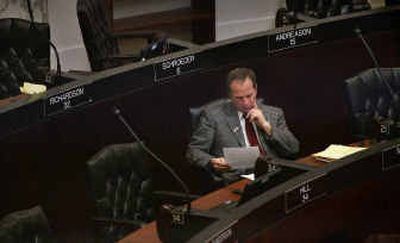The big six

Road construction/bonding
Gov. Dirk Kempthorne wants $1.6 billion in road construction, including major upgrades for U.S. Highway 95, financed by bonds issued against future federal highway allocations.
Where things stand: The governor’s plan finally was brought to the Legislature last week, and the leadership-dominated Senate State Affairs Committee voted unanimously to introduce it. However, several senators on the committee expressed reservations about the sweeping plan.
Water
Idaho faces two huge water issues this legislative session: Approval of a water rights agreement settling claims by the Nez Perce Tribe to virtually all the water in the Snake River; and an effort to avoid a shutoff of thousands of water rights in Southern Idaho, where years of drought have pitted two competing groups of Eastern Snake Plain Aquifer water users against each other.
Where things stand: The Nez Perce water rights agreement passed the Idaho House on a 55-14 vote, after an emotional debate in which opponents pressed their case but said they recognized the measure was going to pass. The three bills implementing the agreement now move to the Senate, where hearings will be held before the Senate State Affairs Committee.
Budget and taxes
Idaho is required to have a balanced budget, and its sales tax is scheduled to drop from 6 percent to 5 percent on July 1, trimming close to $180 million a year from the state’s tax revenues.
Where things stand: Legislative budget writers began setting trimmed-down budgets for state agencies to meet their target of cutting $54 million from Gov. Dirk Kempthorne’s proposed $2.2 billion budget – a plan that could mean controversial cuts in programs the governor wants funded. Among items left out of the budget so far were the governor’s proposed expansion of his rural economic development program. Budget writers are trimming out virtually all new programs and most equipment replacements, but they funded a boost in the state prison budget to cover the state’s exploding prison population.
Education
Education is the top issue in Idaho in virtually every poll. It’s also the single largest slice of the state’s general fund budget.
Where things stand: Legislative budget writers set spare budgets for Idaho’s colleges and universities last week, giving them a 2.5 percent increase in state funding. The public schools budget is up for deliberation Monday. Legislation to crack down on parents of habitual truants cleared the House Education Committee on Thursday, a key test for the measure. SB 1066, would charge parents who purposely keep their kids out of school with a misdemeanor.
Secrecy
Both the Idaho Constitution and Idaho Open Meeting Law require open legislative meetings, but lawmakers have held several closed-door committee meetings in recent years and majority Republicans hold closed-door caucuses.
Where things stand: Opponents of the Nez Perce water rights agreement complained that years of closed-door negotiations on the pact left out the public, and increased opposition among those who couldn’t get facts about the agreement. Backers countered that the “term sheet’ outlining the settlement was released to the public last May and has been openly debated since then. Though legislative committees held closed meetings last year to discuss the agreement, all official legislative meetings on the agreement this year have been open to the public.
Medicaid
The federal-state program that provides health coverage for disabled and poor Idahoans has been growing faster than any other part of the state budget.
Where things stand: At the urging of two North Idaho senators, the Senate voted 19-15 in favor of SB 1143, legislation to allow disabled Idahoans to work without losing their medical care. Though opponents argued that the state budget can’t afford the $400,000-plus to start the new Medicaid buy-in program, Sens. Shawn Keough, R-Sandpoint, and Dick Compton, R-Coeur d’Alene, said it would save money in the long run and is the right thing to do. Under a buy-in program, people with disabilities could work or increase their earnings without losing needed Medicaid coverage, by paying premiums on a sliding scale.